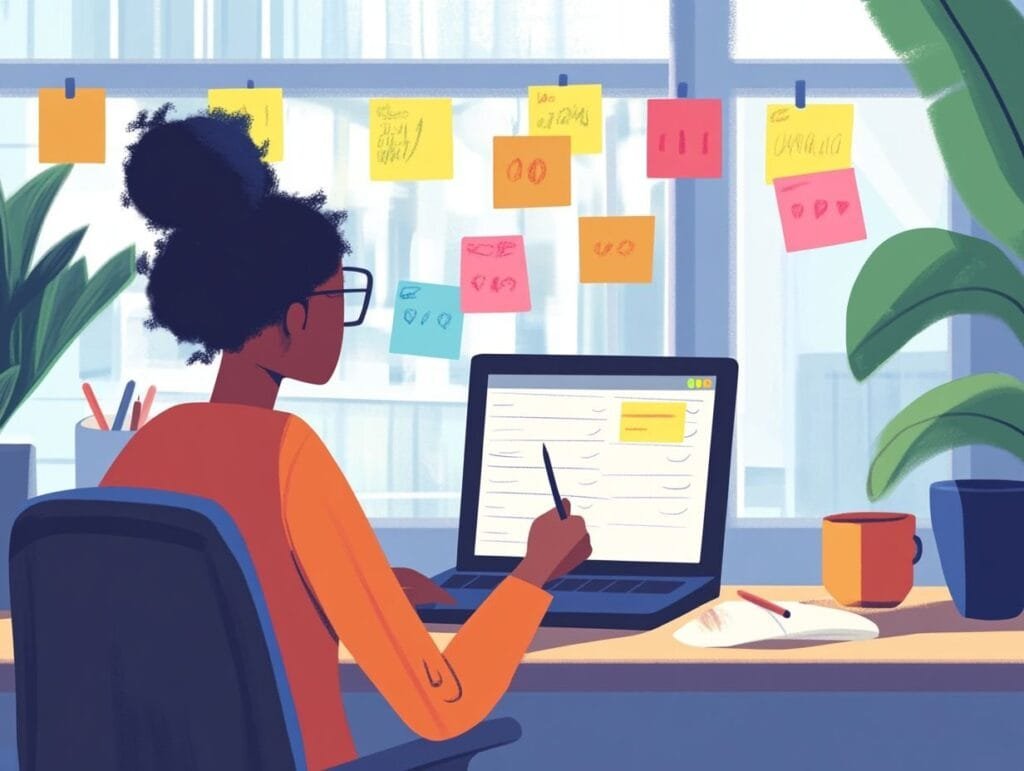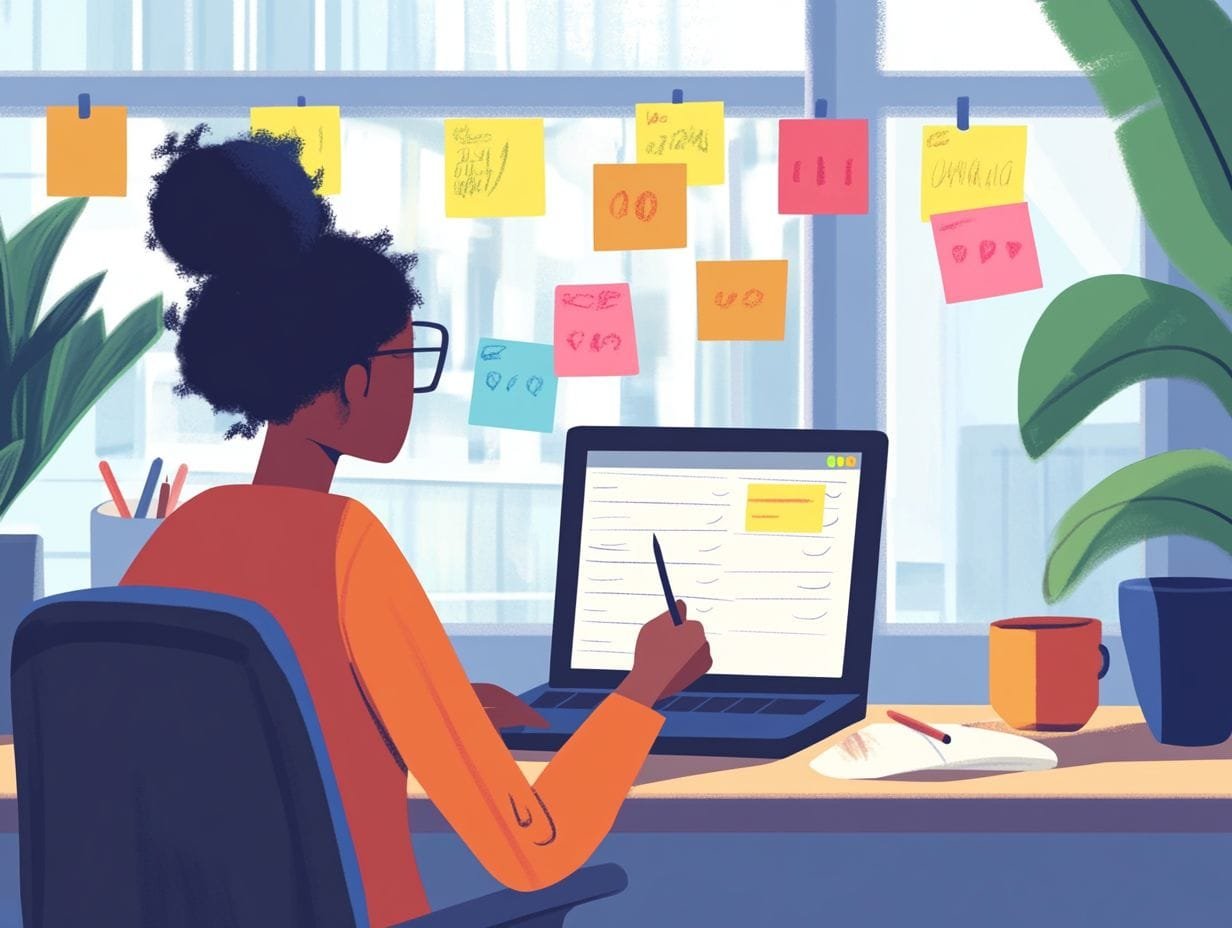Table of Contents
Procrastination can feel like a huge roadblock, often driven by self-doubt and that nagging fear of failure. But it doesn’t have to control your productivity or shake your self-esteem.
Here are 10 powerful techniques that can help you break free from that procrastination cycle and take back your time. From setting clear goals to practicing self-compassion, these strategies are all about empowering you and building your resilience.
Plus, we’ll dive into how to keep that newfound productivity going for the long haul. Get ready to transform your approach and boost your confidence!
Key Takeaways:
- Set clear, achievable goals to focus your efforts and stay motivated.
- Break tasks into smaller, manageable chunks to prevent overwhelm and increase productivity.
- Use a timer to stay on track and maintain a sense of urgency.
10 Powerful Techniques to Stop Procrastinating

Procrastination is something you probably struggle with from time to time, leaving you feeling anxious and overwhelmed as tasks start piling up and deadlines sneak up on you. But don’t worry—by using the right strategies, you can break free from that procrastination cycle and boost your productivity.
By tapping into techniques that emphasize self-discipline and self-awareness, you can adopt a more mindful approach to managing your tasks, which not only helps you focus but also ramps up your motivation.
This article is going to dive into 10 powerful techniques to stop procrastinating, featuring insights from experts like Jay Shetty and handy methods like the Eisenhower Box and the 2-minute rule for better time management.
1. Set Clear Goals
Setting clear goals is crucial for stop procrastinating because it gives you direction and purpose. When you have specific objectives in mind, it’s much easier to stay motivated and disciplined while tackling your tasks and meeting deadlines.
When you set specific and measurable goals, you essentially create a roadmap. This not only helps you focus but also allows you to check in regularly on your progress. That kind of clarity can seriously cut down on feelings of anxiety and overwhelm that often pop up from vague expectations or unrealistic timelines.
For instance, breaking larger projects into smaller, actionable steps can turn those daunting tasks into something much more manageable. Plus, each time you achieve one of those mini-goals, your confidence gets a little boost.
Using planners or digital tools to track your milestones can be a game changer. They can help keep you motivated and build consistent habits, so you maintain that momentum. As your tasks become clearer, the road to completion feels a lot less intimidating, making it easier for you to stay disciplined and engaged.
2. Break Tasks into Smaller Chunks
Breaking tasks into smaller chunks can really help you feel less overwhelmed, making it way easier to tackle complex projects and boost your productivity along the way.
When you focus on manageable pieces, you can take on each part one at a time, which leads to better time management.
For example, instead of trying to write an entire report in one go, you could set aside specific time slots for research, then draft each section separately. This not only helps you organize your thoughts more clearly but also lets you build momentum as you check off each completed chunk, giving you that satisfying feeling of accomplishment.
Using this approach can really ease the anxiety that often comes with big responsibilities, creating a positive feedback loop where making progress motivates you to keep going.
So, embracing the idea of breaking tasks down can enable you to handle your responsibilities with clarity and confidence.
3. Use a Timer
Using a timer can really change the game for you when it comes to improving focus and productivity. It helps you have dedicated work sessions followed by intentional breaks, which can include some nice relaxation techniques.
Take the Pomodoro Technique, for example. It splits your work into intervals—usually about 25 minutes long—with short breaks in between. By using a system like this, you not only keep your concentration sharp but also cut down on mental fatigue. Those little breaks give your mind a chance to recharge, which is super refreshing.
These timed work sessions can also boost your self-discipline. Sticking to a schedule gives you that satisfying sense of accomplishment and helps establish a solid routine.
Plus, knowing there’s a set time for focused work followed by a little reward in the form of a break creates a balanced mindset that keeps your motivation alive and kicking.
4. Create a Reward System
Implementing a reward system can really amp up your motivation by giving you incentives to complete tasks, fostering a sense of accountability, and letting you celebrate your personal achievements along the way.
You can choose from different types of reward systems, like tangible rewards, social recognition, or even treating yourself to something special, all of which can boost your drive to stick to your goals.
By breaking tasks into smaller, manageable parts, you can introduce mini-rewards that create a rhythm of accomplishment and reinforce your self-discipline. This little trick often helps you break free from the procrastination cycle, encouraging you to tackle your responsibilities consistently.
Over time, these rewards don’t just give you immediate satisfaction; they help you develop a long-term habit of effectiveness and reliability. In the end, adopting such systems can completely change how you view tasks, transforming them from daunting obligations into exciting challenges.
5. Find an Accountability Partner

Finding an accountability partner can really boost your motivation and commitment to your tasks. It creates a sense of responsibility and support that helps you to stop procrastinating head-on.
When you have someone to share your goals with, you open up not just for inspiration but also for growth through some good, constructive feedback. Picture this: two friends kickstarting a fitness journey together. When one of you starts feeling a dip in motivation, the other is there to cheer you on and remind you of the commitment you both made. This kind of dynamic isn’t just for fitness, though—it works wonders for work projects, creative endeavors, or personal development too.
For example, you might team up with another writer to swap drafts. This sets up a space where both of you can critique and uplift each other, creating a supportive environment.
Such partnerships create a sense of belonging while keeping each other accountable, which ultimately leads to greater productivity and satisfaction as you crush your goals.
6. Visualize Success
Visualizing success is a powerful technique that can really boost your motivation and self-awareness. It lets you mentally experience the positive outcomes of your hard work and commitment to stop procrastinating.
When you engage in visualization, you can create detailed mental images of your goals. This process helps you understand what achieving those goals truly involves. Techniques like guided imagery not only give you a sense of accomplishment but also help align your mindset with positive expectations.
When you actively picture yourself successfully completing tasks, it strengthens your belief in what you can achieve and deepens your commitment to following through. This mental rehearsal can turn those abstract dreams into concrete plans, fostering a proactive attitude and encouraging you to persevere, even when challenges arise.
7. Practice Mindfulness
Practicing mindfulness can really help you tackle anxiety and those pesky emotional triggers that come with procrastination. It allows you to approach tasks with a calm and focused mindset.
By incorporating mindfulness techniques like meditation and deep breathing exercises into your daily routine, you can cultivate a deeper sense of awareness and presence. These practices encourage you to observe your thoughts and feelings without judgment, creating an environment that’s great for clarity.
As you engage in regular mindfulness exercises, you might notice some significant improvements in your self-discipline and ability to concentrate. This enhanced focus will not only help you complete assignments but also boost your emotional resilience, ultimately enableing you to navigate challenges with greater ease and confidence.
8. Change Your Environment
Changing your environment can really boost your focus and productivity by cutting down distractions and creating a space that’s perfect for getting things done.
When you take the time to thoughtfully design your workspace, you’ll find yourself better equipped to handle your responsibilities without those pesky interruptions. It all starts with decluttering your physical space; a clean and organized desk can do wonders for your mental clarity.
Adding some plants or calming colors can also lift your mood and help you concentrate better.
Don’t forget about productivity tools and apps! Using website blockers or time management trackers can keep you on track and help you maintain your focus.
The psychological perks of having a well-structured environment create a sense of order that can lead to more motivation and overall satisfaction while you’re working.
9. Prioritize Tasks
Prioritizing tasks effectively is crucial for successful task management. It helps you focus on what truly matters so you can meet deadlines without the added stress.
One handy technique you can use is the Eisenhower Box, which allows you to categorize tasks based on urgency and importance. This way, you can filter out distractions that slow you down. This structured approach not only boosts your productivity but also helps you develop self-discipline by giving you a clear roadmap for the day.
You might also consider integrating principles of cognitive behavioral therapy to reshape how you think about your tasks. By challenging those negative thoughts and adopting a more positive outlook on productivity, you can tackle your responsibilities with renewed motivation and resilience. This enablement can help you accomplish your goals more efficiently.
10. Practice Self-Compassion

Practicing self-compassion can really boost your self-awareness and help you make positive changes in your behavior, which is super helpful when navigating those pesky emotional triggers that lead to procrastination.
This approach encourages you to have a kinder inner dialogue, allowing you to acknowledge your feelings without being too hard on yourself. When you face setbacks, self-compassion nudges you to reassess the situation gently instead of diving into self-criticism.
For example, if you miss a deadline, you might initially feel overwhelmed, but with self-compassion, you can take a step back, figure out what went wrong, and plan how to improve for next time.
This nurturing perspective not only helps reduce feelings of shame but also strengthens your resilience. It boosts your overall mental health and serves as a motivational tool to tackle future challenges with a fresh sense of energy.
Productivity Tips or How to Maintain Productivity and Stop Procrastinating in the Long Run?
To maintain long-term productivity and keep procrastination at bay, you need to commit to continuous self-discipline. It’s all about finding effective time management strategies that work for you and learning to recognize those emotional triggers that might lead you to avoid tasks.
By managing those triggers, you’ll be better equipped to stay focused and productive.
1. Reflect on Your Progress
Regularly reflecting on your progress is key for self-awareness and accountability. It helps you spot patterns in your behavior and tweak your strategies to beat procrastination.
Setting aside dedicated time for this reflection can really clear up any fog around your ongoing projects, goals, and personal aspirations. You might want to try tools like journaling, mindfulness exercises, or guided reflections to dig deep into your experiences and pull out those valuable insights.
Using frameworks like SWOT analysis—where you evaluate your strengths, weaknesses, opportunities, and threats—gives you a structured way to understand past decisions. This kind of practice doesn’t just help you make smarter choices in the future; it also boosts your overall productivity.
By fostering a proactive mindset and encouraging continuous learning, you’ll end up making more informed and effective decisions.
2. Learn from Mistakes
Learning from mistakes is a crucial part of your personal growth journey. It’s all about fostering those behavior changes that can really boost your self-discipline and help ease any anxiety you might have about upcoming tasks.
When you take a constructive approach to analyzing your errors, you can shift your focus from fearing failure to spotting the opportunities that come from setbacks. This change in perspective encourages you to be kinder to yourself instead of being overly critical.
Embracing your mistakes instead of avoiding them can really ramp up your motivation and improve your task management skills.
When you recognize that each slip-up is just a stepping stone, you’ll find yourself becoming more resilient. This newfound resilience makes you more willing to take risks and chase your goals with a fresh sense of enthusiasm.
3. Practice Self-Care
Practicing self-care is absolutely essential for keeping your mental health in check and ensuring you stay productive. It helps you create a balanced lifestyle that boosts your motivation and keeps burnout at bay.
By incorporating different self-care techniques like mindfulness, physical exercise, and fun leisure activities, you can really strengthen your emotional resilience. This makes it easier for you to tackle daily challenges with confidence.
When you prioritize your mental health, you’ll find that your decision-making becomes clearer and your focus sharpens, which helps curb any procrastination tendencies.
In the end, taking care of yourself leads to better performance in all areas of life. Your personal happiness and fulfillment will naturally translate into a surge of motivation and a more proactive attitude toward whatever tasks are on your plate.
4. Seek Support

Seeking support from friends, family, or professionals can really give you the accountability and motivation you need to stop procrastinating and manage those emotional triggers more effectively.
Having a reliable support network lets you share your goals and challenges, creating an environment where encouragement just thrives. For instance, joining a study group can help foster a sense of commitment, making those deadlines feel way more manageable as everyone works together toward common objectives.
Finding a mentor can be a game-changer, too. They can offer invaluable guidance and insights from their own experiences, helping you develop discipline through shared strategies. Plus, online communities or local workshops can be great places to connect with like-minded individuals who totally understand the struggle of procrastination, providing a space for connection and shared motivation.
Frequently Asked Questions
What is procrastination and why is it harmful?
Procrastination is the act of delaying or postponing tasks, often for no valid reason. It can be harmful because it leads to wasted time and missed opportunities, as well as increased stress and anxiety.
How can I stop procrastinating now?
One powerful technique is to break down big tasks into smaller, more manageable ones. This helps to reduce overwhelm and makes it easier to get started.
Why is it important to set clear goals?
Setting clear goals gives you a sense of direction and purpose, making it easier to prioritize tasks and stay focused. This can help to stop procrastinating and increase productivity.
What role does self-doubt play in procrastination?
Self-doubt can often lead to procrastination as it causes us to question our abilities and fear failure. Learning to overcome self-doubt is crucial for stop procrastinating now.
How can I boost my productivity?
Some techniques to boost productivity include setting a schedule, eliminating distractions, and taking breaks. Experiment to find what works best for you.
Why is it important to learn from mistakes?
Mistakes are learning opportunities, and reflecting on them can help us improve and grow. By embracing our mistakes, we can build resilience and increase our self-esteem, ultimately reducing the likelihood of procrastination.





18 thoughts on “How to Stop Procrastinating Now: 10 Powerful Techniques to Boost Productivity”